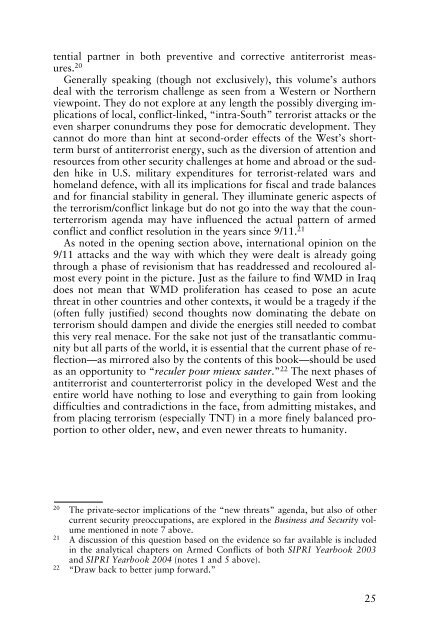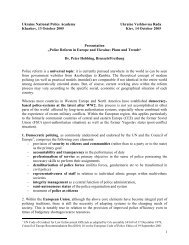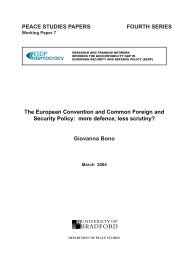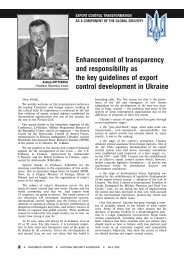combating terrorism and its implications for the security sector - DCAF
combating terrorism and its implications for the security sector - DCAF
combating terrorism and its implications for the security sector - DCAF
You also want an ePaper? Increase the reach of your titles
YUMPU automatically turns print PDFs into web optimized ePapers that Google loves.
tential partner in both preventive <strong>and</strong> corrective antiterrorist measures.<br />
20<br />
Generally speaking (though not exclusively), this volume’s authors<br />
deal with <strong>the</strong> <strong>terrorism</strong> challenge as seen from a Western or Nor<strong>the</strong>rn<br />
viewpoint. They do not explore at any length <strong>the</strong> possibly diverging <strong>implications</strong><br />
of local, conflict-linked, “intra-South” terrorist attacks or <strong>the</strong><br />
even sharper conundrums <strong>the</strong>y pose <strong>for</strong> democratic development. They<br />
cannot do more than hint at second-order effects of <strong>the</strong> West’s shortterm<br />
burst of antiterrorist energy, such as <strong>the</strong> diversion of attention <strong>and</strong><br />
resources from o<strong>the</strong>r <strong>security</strong> challenges at home <strong>and</strong> abroad or <strong>the</strong> sudden<br />
hike in U.S. military expenditures <strong>for</strong> terrorist-related wars <strong>and</strong><br />
homel<strong>and</strong> defence, with all <strong>its</strong> <strong>implications</strong> <strong>for</strong> fiscal <strong>and</strong> trade balances<br />
<strong>and</strong> <strong>for</strong> financial stability in general. They illuminate generic aspects of<br />
<strong>the</strong> <strong>terrorism</strong>/conflict linkage but do not go into <strong>the</strong> way that <strong>the</strong> counter<strong>terrorism</strong><br />
agenda may have influenced <strong>the</strong> actual pattern of armed<br />
conflict <strong>and</strong> conflict resolution in <strong>the</strong> years since 9/11. 21<br />
As noted in <strong>the</strong> opening section above, international opinion on <strong>the</strong><br />
9/11 attacks <strong>and</strong> <strong>the</strong> way with which <strong>the</strong>y were dealt is already going<br />
through a phase of revisionism that has readdressed <strong>and</strong> recoloured almost<br />
every point in <strong>the</strong> picture. Just as <strong>the</strong> failure to find WMD in Iraq<br />
does not mean that WMD proliferation has ceased to pose an acute<br />
threat in o<strong>the</strong>r countries <strong>and</strong> o<strong>the</strong>r contexts, it would be a tragedy if <strong>the</strong><br />
(often fully justified) second thoughts now dominating <strong>the</strong> debate on<br />
<strong>terrorism</strong> should dampen <strong>and</strong> divide <strong>the</strong> energies still needed to combat<br />
this very real menace. For <strong>the</strong> sake not just of <strong>the</strong> transatlantic community<br />
but all parts of <strong>the</strong> world, it is essential that <strong>the</strong> current phase of reflection—as<br />
mirrored also by <strong>the</strong> contents of this book—should be used<br />
as an opportunity to “reculer pour mieux sauter.” 22 The next phases of<br />
antiterrorist <strong>and</strong> counterterrorist policy in <strong>the</strong> developed West <strong>and</strong> <strong>the</strong><br />
entire world have nothing to lose <strong>and</strong> everything to gain from looking<br />
difficulties <strong>and</strong> contradictions in <strong>the</strong> face, from admitting mistakes, <strong>and</strong><br />
from placing <strong>terrorism</strong> (especially TNT) in a more finely balanced proportion<br />
to o<strong>the</strong>r older, new, <strong>and</strong> even newer threats to humanity.<br />
20 The private-<strong>sector</strong> <strong>implications</strong> of <strong>the</strong> “new threats” agenda, but also of o<strong>the</strong>r<br />
current <strong>security</strong> preoccupations, are explored in <strong>the</strong> Business <strong>and</strong> Security volume<br />
mentioned in note 7 above.<br />
21 A discussion of this question based on <strong>the</strong> evidence so far available is included<br />
in <strong>the</strong> analytical chapters on Armed Conflicts of both SIPRI Yearbook 2003<br />
<strong>and</strong> SIPRI Yearbook 2004 (notes 1 <strong>and</strong> 5 above).<br />
22 “Draw back to better jump <strong>for</strong>ward.”<br />
25

















